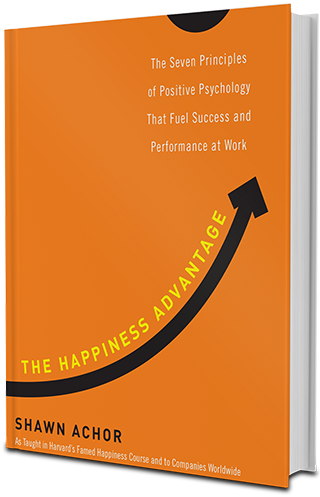
Success does not lead to happiness. Rather, happiness leads to success, according to this book. The brains’s neuroplasticity means we can make our thinking more flexible and actually become smarter, and we can help this to happen by taking steps to become happier. For example, in one study, doctors made more accurate diagnoses if they were given a lollipop beforehand. Such trivial mood enhancers make us more effective — that’s The Happiness Advantage, the first of his seven principles.
Achor lists some ways to become happier:
- Meditate
- Look forward to something
- Be kind
- Go outside
- Exercise
- Buy experiences rather than things
- Exercise your strengths (see viasurvey.org to find out what they are)
Apart from the obvious health benefits of some of these, being kind has the added benefit of making other people happier too. Share the love!
The rest of the seven principles approach the subject from different angles.
The Fulcrum and the Lever encourages us to change our mindset to change how we perceive the world. There is a very amusing story about how the young Achor used this on his sister to avert a potential family argument. The whole technique is dealt with more fully in Timothy Wilson’s Redirect.
The Tetris Effect helps us to see positivity everywhere by priming ourselves to see it. The “Three Good Things” exercise, where every night before bed you write down three good things about the day, is an easy way to do this. That is also recommended by Martin Seligman amongst many others.
Falling Up is another name for post-traumatic growth, a healthy response to stressful events that allow us to recover and grow from them. We should change the counterfactual: if you break your leg, don’t be miserable that your leg is broken; be happy that only one is broken, and that you didn’t lose it entirely.
The Zorro Circle says we should focus on small, manageable goals first, then expand. Tiny Habits is a practical exploration of this powerful idea.
The 20-second Rule: If you want to develop a habit, you must do everything you can to make it as easy as possible. For example, just 20 seconds can be the difference between never practising your guitar, and practising every day. Leave your guitar out within reach, not in a cupboard. I can vouch for this from experience.
Finally, we should profit from our Social Investment by using our social support networks. This is another of Martin Seligman’s pillars of happiness.
These seven principles aren’t really systematic. The Fulcrum and the Lever, The Tetris Effect and Falling Up are really pretty much the same thing. But taken together, there’s a lot here to chew on and I’m very happy to have read it. See what I did there?
For a snappy summary of the book, see Shawn Achor’s TED Talk.
But it’s not all beer and skittles. For a dissenting view, see William Davies’ The Happiness Industry: How the Government and Big Business Sold Us Well-Being.
I haven’t read William Davies’ book, but I listened to his talk at the RSA on “The Happiness Agenda“.There is a lot of alarmist stuff to disagree with, but I think his central point is right: there seems to be too much focus on individual wellbeing, ignoring the crucial role that society plays in our quality of life.